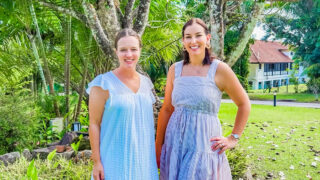Which preschool in Singapore should you choose?
Whether you’re already living here and have children approaching school age, or your contemplating a move here with young kids, looking at the best preschools in Singapore will be top of your list of things to get sorted. While you can refine your search by the neighbourhoods you like or the type of learning you want your kids to experience, hearing the opinions of other parents and their reviews and recommendations of both preschools and kindergartens in Singapore can be very helpful in making a decision. That’s why we’ve put together this feature!
27 families share their recommendations for kindergartens and preschools in Singapore:
Swiss School in Singapore
Founded: 1967
Dates: August to June
Ages: From 2 to 12 years
Size: 250 students
Curriculum: Swiss Curricula – German Stream, Canton of Zug; French Stream – Canton of Valais
Preschool Review: Milena and Sami Segouali, Swiss-Portuguese and Swiss-Tunisian; Elouan (3)
We have been living in Singapore since August 2023 – I (Milena) was hired as a teacher at the Swiss School in Singapore and Elouan has been attending there since then. Our experience has been delightful.
This is Elouan’s first time attending preschool and he’s really enjoying it. He’s involved in diverse activities including sand play, swimming and experiments in class. He shares his experience with us when he comes home and we can tell that he is learning as well as enjoying it.
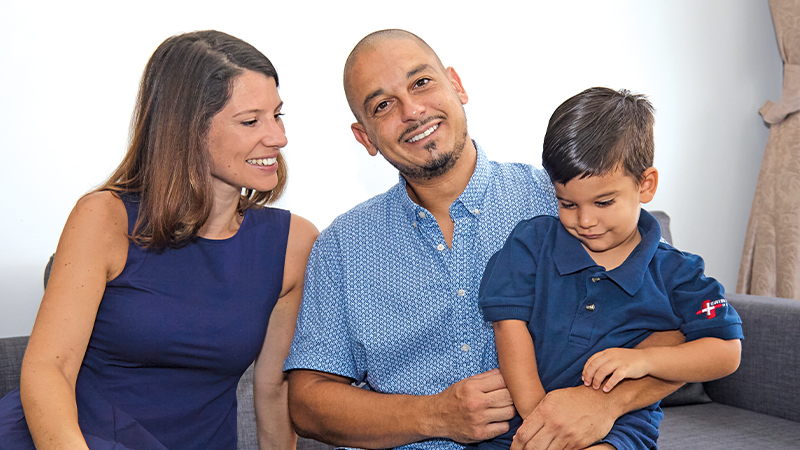
Elouan is learning both English and French, which makes it easier for him to communicate with us at home. Teaching kids of this age is challenging but here, the teachers have a lot of experience and are energetic, which makes a huge difference. Overall, we are really happy with Elouan’s learning journey at this preschool in Singapore. I’m really happy to be a part of it, not only as a teacher but also as a parent. I would definitely recommend it to other families with respect to our child’s learning and development. Since I work here, I’m also familiar with the operations and facilities, which are top-notch.
We think this is truly a special preschool – away from the busy city, and set in the middle of the jungle. Being close to nature is great for children.
38 Swiss Club Road
6468 2117 | swiss-school.edu.sg
Nursery at Tanglin Trust School
Founded: 1925
Dates: August to July
Ages: From 3 years
Size: 2,800 students
Curriculum: Enhanced English National Curriculum with an international perspective, A levels, IBDP
Kindergarten Review: Kirsty and Pavlos Spyropoulos, British and Greek; Leo (8) and Isabella (4)
We’ve been living in Singapore since August 2014. Leo started Nursery at Tanglin Trust School in 2019 and is now in Year 3. Isabella started in Nursery this year.
We were looking for a kindergarten in Singapore with an outstanding academic record, excellent pastoral care, great facilities and an environment where our children wouldn’t feel lost in a huge campus. Tanglin ticked all the boxes for us.
Both our children settled in well from day one, thanks to the gentle induction programme in Nursery and the optional early finish time. The teachers get to know each child very well and really do bring out the best in them. Leo and Isabella are always full of excitement and unable to stop chatting about what they’ve been up to each day.

Isabella has been attending Forest School as part of her weekly curriculum, which she loves. We spend many happy hours in the Infant Library. Her favourite activity is gymnastics where she gets to use the world-class gymnastics centre in the new Centenary Building.
There’s a very strong sense of community throughout. One reason is the house system – all children from Nursery onwards are included and get involved in House events. There are also so many events throughout the year put on by Friends of Tanglin. Parents, staff and children get together for bi-annual movie nights, the Christmas fair, parent quiz nights and an annual cross country run.
They always goes the extra mile and they’ve far exceeded all of our expectations. We’re so pleased that our children have the opportunity to attend such an incredible preschool in Singapore.
95 Portsdown Road
6778 0771 | tts.edu.sg
SJI International Preschool
Founded: 2024
Dates: January to December
Ages: 2 to 6 years
Size: 96 to 100 students
Curriculum: Bilingual, inquiry-based curriculum that is holistic, co-constructed and tailored to support every individual child
Preschool Review: Eileen Dong, Singaporean; Alison Pippi (5)
We returned to Singapore in 2018 and Alison has been attending SJI International Preschool since it opened on 1 February 2024. This preschool in Singapore was highly recommended by a very good friend. I met with the Head of School, Dr Geraldine Teo-Zuzarte, and her management team during their Open House. What touched me was their passion for preschool education, and a commitment and willingness to make things better.
To me, an all rounded preschool isn’t about having the most robust bilingual curriculum. The children are forming their character at this age and SJI International focuses on teaching values. I particularly like the thanksgiving prayer before each meal – it teaches the child to be thankful for the food and whoever brought it to the table.
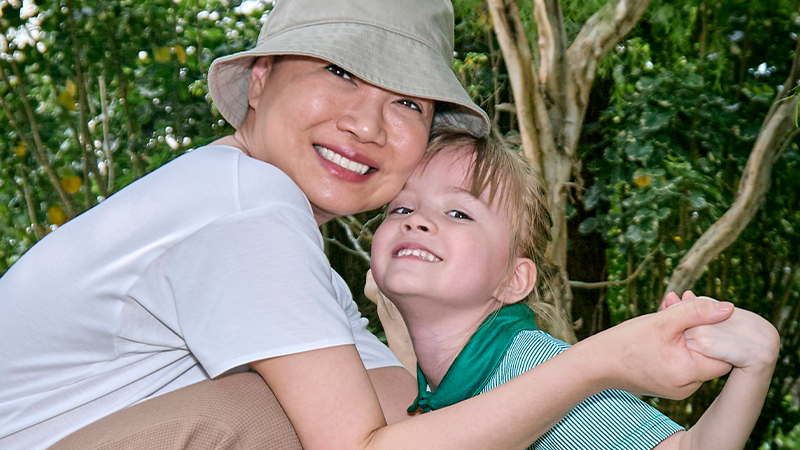
I’m a single mum, entrepreneur and cancer warrior. After the first day of preschool, I informed them that we were unable to attend the next day due to a medical emergency. I was hugely surprised when a staff member from the management team called me to show concern and to offer help during my hospitalisation.
After my discharge, the same staff member extended support again. This preschool in Singapore is sensitive in handling the feelings of Alison as well as communication on queries about my single parent role and my medical condition, among other matters. The preschool is inclusive; there’s no discrimination or stereotyping.
I feel genuineness and love from them. I strongly believe they will play an instrumental role in Alison’s preschool education and beyond, especially in nurturing and guiding her to be someone with good values and outlook on life. We’re very blessed to be in this partnership with them.
49B Holland Road
sji-internationalpreschool.com.sg
UWC South East Asia Kindergarten
Founded: 1971 (UWCSEA Dover); 2008 (UWCSEA East)
Dates: August to June
Ages: From 4 years
Size: 3,116 (Dover); 2,805 (East)
Curriculum: UWCSEA concept-based curriculum, IGCSE, IBDP
Kindergarten Review: Albena and Alan, Bulgarian-Canadian and French; Marko (9) and Kaia (6)
We’ve been living here for 15 years (Alan) and 13 years (Albena) respectively, and our children are currently attending at the Dover campus. Both started in this kindergarten in Singapore when they were four years old in K1. This is Marko’s fifth year and he’s in Grade 3 at the moment; it’s Kaia’s third year and she’s in Grade 1.
We chose UWCSEA as its nonprofit status reflects a commitment to education. Additionally, the unwavering commitment to sustainability and service holds great significance for us, as does its dedication to providing opportunities for students from high needs communities around the world through scholarships.
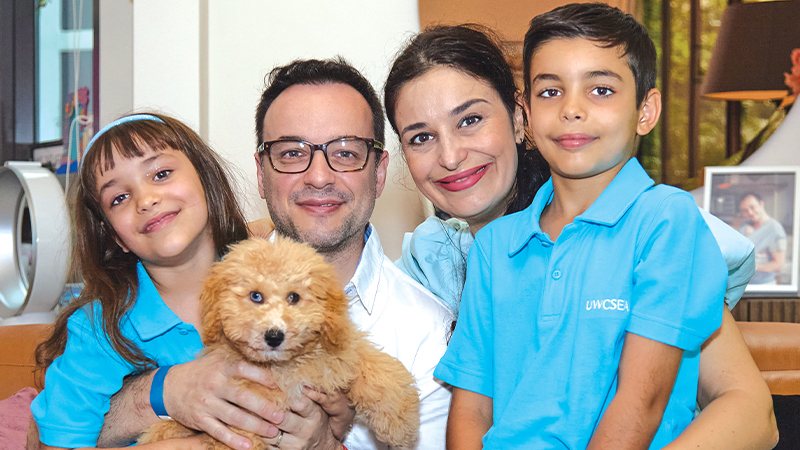
The diverse student body is aptly described as a mix of United Nations kids, an inclusive and globally representative environment. The thoughtful formation of diverse classrooms from K1 ensures a well balanced mix of nationalities, genders and personalities, providing our children with enriching opportunities to learn from those who are different from them. The faculty is highly professional and remarkably kind. The curriculum, particularly in the Infant and Junior school, is excellent and regularly revised to adapt to our rapidly changing environment.
Our children are encouraged to serve both within the preschool and the broader community under Global Concerns. Notably, Kaia actively participates in a service where she plays board games with seniors at Lion Befrienders and sings songs for them.
The community creates a wonderful environment for parents who enjoy participation. There are various activities such as tennis, basketball, walking groups and yoga available as well as opportunities for volunteering in class. The Parents’ Association organises numerous events, providing ample possibilities for fostering connections with other parents.
We wholeheartedly recommend this kindergarten in Singapore to any family that values diversity, service, kindness, sustainability and community.
Dover Campus: 1207 Dover Road | 6774 2653
East Campus: 1 Tampines Street 73 | 6305 5353
uwcsea.edu.sg
Canadian International School Kindergarten
Founded: 1990
Dates: August to June
Ages: From 2 years
Size: Over 3,100 students
Curriculum: IB (PYP, MYP, DP)
Kindergarten Review: Chelsea and Milan Micic, Canadian and Croatian; Claudio (7) and Mia (4)
We’ve been living in Singapore for seven years and both our children go to the Canadian International School (CIS). We learned about them through friends. For us, the deciding factors were the community feel and amazing Chinese-English Bilingual Programme.
It’s Claudio’s fifth year here and he’s in Grade 2 of the Chinese-English Bilingual Program. Mia is in her second year and she’s in the Junior Kindergarten Chinese-English Bilingual Programme.
This has truly been one of the best schools in Singapore for our family. It all starts with the exceptional teachers who have positively impacted the lives of our children.
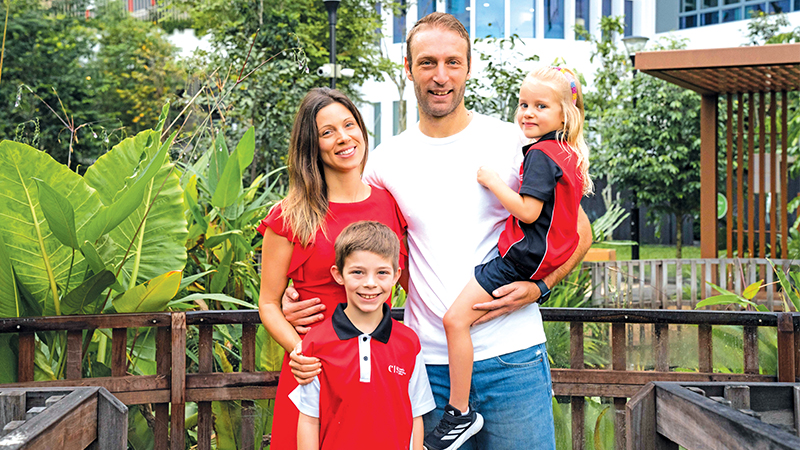
The IB and bilingual programme is an amazing opportunity for our children to develop life and language skills. Academically, our children thrive in the inquiry environment with a variety of activities to expand their knowledge. We’re always impressed by the amount of care dedicated to the healthy growth and development of our children. We have also found many friends in the parent communities. One of the aspects that has kept us in Singapore is the sense of school community and the friendships our children have formed at CIS.
We tell people all the time that it’s one of the best preschools in Singapore we have experienced and been a part of. Academics, social aspects, educators, extracurricular activities, facilities – you name it. If you’re seeking a preschool that offers the IB curriculum and approaches each student’s needs holistically, your search ends here.
7 Jurong West Street 41
6467 1732 | cis.edu.sg
Dulwich College Kindergarten (Singapore)
Founded: 2014
Dates: August to June
Ages: From 2 years
Size: 2,900 students
Curriculum: Enhanced English National Curriculum, IGCSE, IB (DP, CP)
Kindergarten Review: Melanie and Robert Ridland, British; Millie (8), Max (6) and Poppy (3)
We arrived in Singapore in August 2020 and Millie immediately joined Reception at Dulwich College Kindergarten (Singapore) (DUCKS). Max joined Reception in August 2022 and Poppy will join in August 2024. We have friends who have been at Dulwich for a while and were delighted to be offered a place!
Millie and Max really enjoy life at this kindergarten in Singapore. There’s a broad curriculum supported by excellent facilities. They both had very good Reception teachers who made them feel comfortable from the start. Highlights include the beautiful DUCKS library, Forest School, on-site pool and driving cars on the roof. Millie and Max both enjoy learning Mandarin and are loving their primary experience.
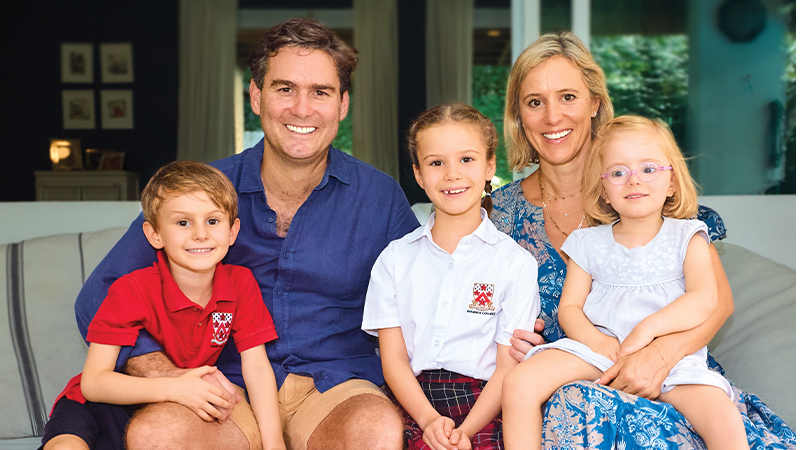
The children have enjoyed a multicultural education and have a good understanding of their global responsibilities.
This is a happy school with a warm buzz to it. We also recommend Dulwich to parents looking for a rich experience with a bilingual aspect. The facilities are outstanding and enable the children to learn in a very supportive environment.
71 Bukit Batok West Avenue 8
6890 1003 | singapore.dulwich.org
Holland International Preschool
Founded: 1920
Dates: August to July
Ages: 1.5 to 12 years
Size: 300 students
Curriculum: International Early Years; Dutch Stream: Dutch National and IPC; English Stream: British National and IPC
Preschool Review: Hannah Aldean and Shayne Vervoort, British and South African; Imara (5) and Xavi (3)
We have been living in Singapore for almost two years and both our children have been attending Holland International Preschool for a year now. They were at another preschool that closed down, and we were looking for a smaller one where English is a first language. It was important for us that the family and children were part of a small preschool community.
Their standalone nature gave that small school feeling we were looking for. The grounds are quaint and homely and theyl had just started their English stream so it was a great fit for the family.
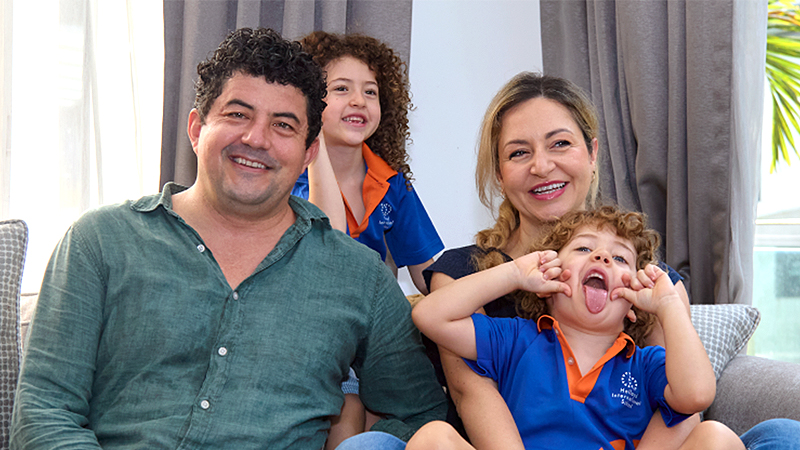
We recall the relief we felt when we realised that HIS didn’t have a requirement for uniform and they didn’t believe in setting homework for the kids. We’re living in a place where education is already at a good standard so we don’t place huge value on unnecessary pressures at a young age.
The teachers and community are the stand out. Everyone here knows the children by name, where they fit in and how their personalities add to the preschool. We enjoy being part of the weekly assemblies, important holidays and school events. Imara being in the first class in the new English stream brings an added element of adventure to her place in this preschool in Singapore.
Our children enjoy being part of the community, but at the same time, they’re able to bring their own stamp to the preschool, which is growing into an English-Dutch dual-curricular. We’ve been really pleased that our children are so happy here.
65 Bukit Tinggi Road
6466 0662 | hollandinternationalschool.sg/en
Australian International School Early Learning Village
Founded: 1993
Dates: January to December
Ages: 2 months to 18 years
Size: Over 2,500 students
Curriculum: International Baccalaureate (IB) PYP from Preschool to Year 5, Australian Curriculum in Years 6 to 8, Cambridge IGCSE and Australian Curriculum in Years 9/10, Higher School Certificate or IBDP in Years 11/12
Preschool Review: Jasmine and Simon Ree, Singaporean and Australian; Amelie (20), Juliette (18), Aurelia (14) and Alexander (4)
We returned to Singapore from Perth in 2018. Our two oldest daughters are currently in Perth, while Aurelia and Alexander are in their second and third year respectively at the Australian International School (AIS) – Aurelia in Year 8, Alexander in P3.
We’re impressed by the curriculum at AIS – it offers a holistic approach to education, providing a well-rounded experience that suits our active children perfectly. Our kids love both the sports and music programmes. We’ve seen Aurelia’s passion as a violinist blossom with the Secondary Strings ensemble. Our kids also have numerous opportunities for performances and Aurelia is supported by a highly experienced music team.
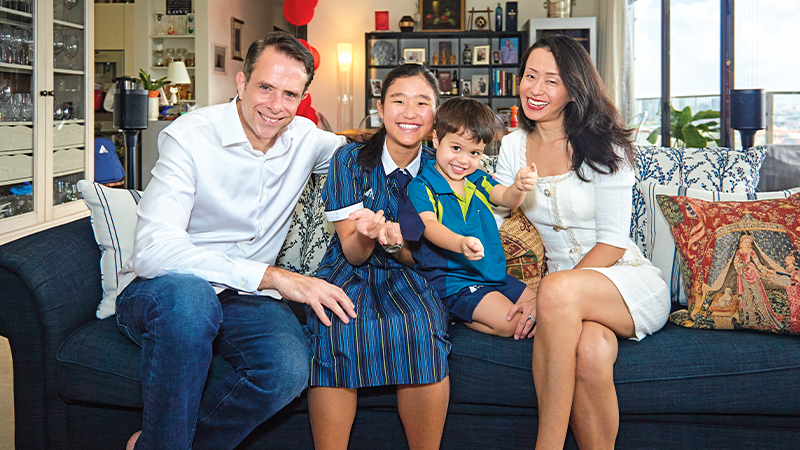
For Alexander, the support we’ve received from the preschool team has exceeded our expectations. The guidance in managing toddlers, ranging from sleep care to nutritional aspects and understanding how to navigate a child’s emotional development, has been invaluable to us. His P1, P2 and P3 years have been enriched with engaging experiences. This includes classrooms equipped with their own sand pits for daily water play and hands-on experiments. Both children love going to school, which is so important.
One standout aspect is the provision of both IB and HSC options at the high school level. Besides broadening the educational horizon for our children, it also opens doors to universities globally.
We absolutely recommend this preschool in Singapore to other parents. The team fosters a vibrant community. The range of co-curricular activities, coupled with the dedicated and supportive teaching staff, has created an enriching and nurturing educational experience for our children. Overall, they’re providing a well-rounded education that caters to children’s unique needs and interests.
1 Lorong Chuan
6883 8127 | ais.edu.sg
Stamford American International School Early Learning Village
Founded: 2009
Dates: August to June
Ages: From 2 months
Size: 3,000 students
Curriculum: Stamford Diploma (American High School equivalent, which can include subjects in IB, AP and Stamford courses), IB (PYP, MYP, DP), AP, BTEC Diploma
Preschool Review: Nesma Abdel Sattar and Elhassan Abdellatif, Egyptian; Raja (9), Najatt (7) and Zeenat (3)
Our family has been living in Singapore since the end of 2018 and our daughters attended Stamford American International School right away.
During our pre-move online search, we were looking for a big international school and Stamford stood out immediately. It’s a very friendly and welcoming place for our family – we quickly became part of a vibrant international community.
We fell in love with the Early Learning Village. It’s designed for children using earthy colours, cute little doors and a campus that is child-centred. The preschool organises many activities and we love being actively engaged in doing things with our girls like swimming, field trips and reading. Stamford is great at academics, too, and reading is a huge focus that we enjoy.
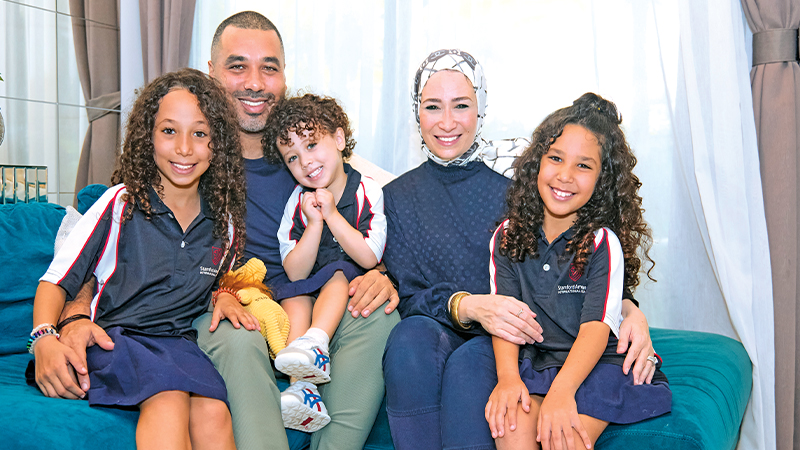
The preschool empowers students and works on their growth. We remember how we felt at the first Parent Teacher Conference when our first-grader held the parent meeting and presented her work to us. The staff are very attentive – the doors are always open and they listen to everyone’s thoughts, curating an inclusive learning experience in a warm and supportive environment.
One of the most cherished aspects for our family is their commitment to celebrating cultural diversity. The International Festival provides a platform for children to represent their home countries. As the sole representatives of Egypt last year, hearing the national anthem and seeing our girls holding the flag in their pharaoh costumes created unforgettable moments for our family.
Our girls come home happy with endless stories and that’s what we love the most!
1 Woodleigh Lane
6653 2947 | sais.edu.sg
Singapore American School kindergarten
Founded: 1956
Dates: August to June
Ages: 3 to 18 years
Size: 4,131 students from 63 countries
Curriculum: Comprehensive liberal arts education within the daytime and afterschool programmes, with open admissions.
Kindergarten Review: Danielle Santori and Ryan Hickman, American and American-Canadian; Amelia (6) and Maren (4)
We have lived here for two years and both our children attend the Singapore American School (SAS). Amelia has attended the early learning centre and Kindergarten in Singapore, and she’s now in first grade.
When we first arrived in Singapore, we attended various parent workshops and on campus events to meet various families in similar situations.
We decided to enrol with them because the facilities were amazing and it was a great continuation of our daughter’s education that she started in the US.
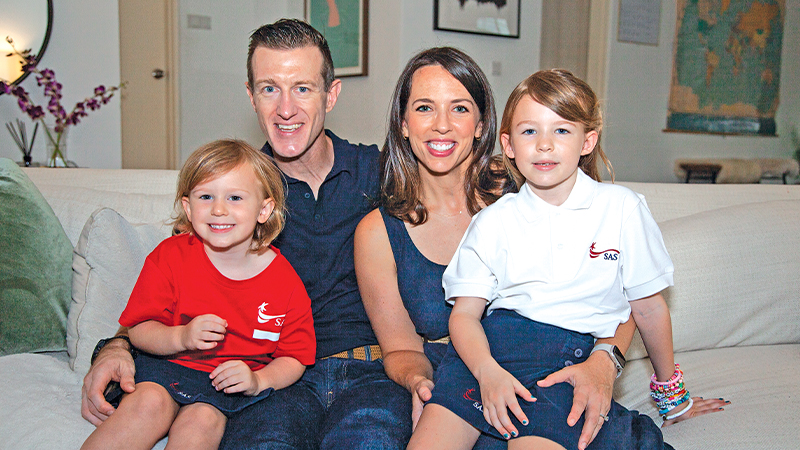
It’s an international preschool in Singapore and the children get a world-class education. The teachers are amazing and very intentional in their teaching.
They also have world-class resources and facilities, and a huge campus to explore, starting from the various playgrounds to the climbing walls to the libraries and music programmes.
Amelia has absolutely loved the music programme; she has been exposed to so many different instruments and genres of music. The campus music department is always buzzing with live performances, musicals or talent shows. She has started playing the ukulele and piano.
We love the community; it’s an amazing community to build connections with the students, parents and teachers. My kids celebrate all different cultures – they are becoming global citizens.
40 Woodlands Street 41
6363 3403 | sas.edu.sg
Lily Valley Preschool in Singapore
Founded: 1995
Dates: August to June
Ages: From 3 years
Size: Approximately 800 students
Curriculum: IB (PYP, MYP, DP)
Preschool Review: Kaori and Naoki Kakuta, Japanese; Ryunosuke (4) and Juri (2)
We have been living in Singapore for two years. Both Ryu and Juri have been attending Lily Valley since April 2023. Ryu started in N2 and he’s now in K1, while Juri started in PG and she’s now in N1.
We attended an open day and decided to enrol our children as we witnessed the teachers’ passion, kindness and dedication. Their care and support create an environment where students can truly be themselves.
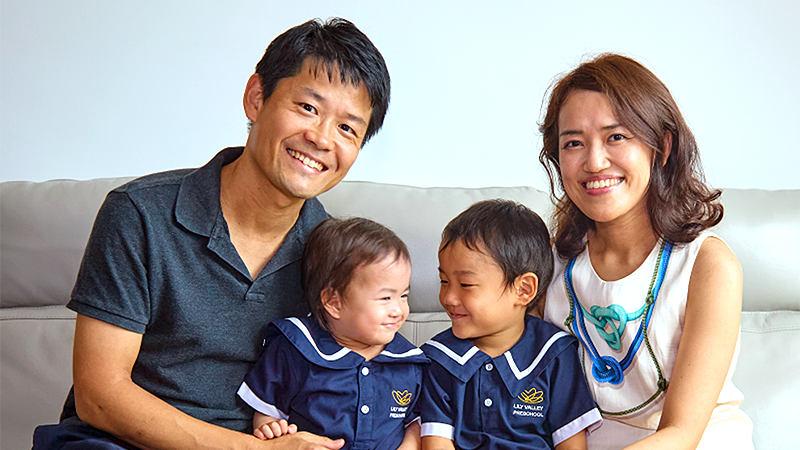
We are fond of the child-friendly facilities such as the glass-walled rooms that creates an environment with natural light, the thoughtfully designed play spaces and ateliers. The art atelier is equipped with digital tools and technology. Together with a dedicated art teacher, it’s wonderful for developing the next generation’s skill sets. Recycled materials such as cardboard and fallen leaves are used in creating art that reflects termly themes. This promotes sustainability and also encourages children to creatively express themselves.
We speak only Japanese at home and our children are learning English and Mandarin through the immersion programme at this preschool. They often count numbers and sing songs in Mandarin at home. Juri is now able to understand basic questions in Mandarin and has started responding to them in Mandarin or English.
Our experience here has been excellent. We highly recommend it, especially for those who want to provide their children with a quality schooling experience through the Reggio Emilia-based curriculum. Our children like going to this preschool in Singapore very much, especially Ryu – he sometimes wears his uniform on weekends, which makes our family smile.
#02-27/28 Marina Square, 6 Raffles Boulevard
9248 4281 | lilyvalley.com.sg
International Community School (Singapore) kindergarten
Founded: 1993
Dates: August to June
Ages: From 4 years
Size: 400+ students
Curriculum: American
Kindergarten Review: Toyin and Joe Ope, American; Daniela (7) and Joshua (6)
We’ve been living in Singapore for about five years. Daniela has been at International Community School (ICS) since 2023 and is now in Grade 2; Joshua joined this year and is in K5.
We learned about ICS through friends and work colleagues who have children here. They have everything we hoped for in a school and much more.
If we had to describe them in one word, it would be community. From the teachers to the staff members, students and even parents, the entire ecosystem is designed to look out for the best interest of every student. All our children started in the middle of the academic year and everyone went out of their way to embrace them and make them feel included. The staff members know the name of every child and everyone is greeted by name each morning at drop-off.

The quality of the teaching is extremely high and the students are set up for academic success. In addition, all of the teachers are incredibly kind, nurturing and patient. It’s evident that character development is a vital aspect of the school’s mission.
We’ve been really impressed with the elementary Mandarin programme. Both our children attended a bilingual programme at a local neighbourhood preschool in Singapore and it was important that they continue learning Mandarin.
Despite being a smaller school, there’s no shortage of extracurricular activities and other opportunities for the students to have fun while developing valuable skills.
We absolutely recommend ICS for anyone searching for a preschool with a caring and inclusive environment, where each student’s individual needs are met without compromising high academic standards.
27A Jubilee Road
6776 7435 | ics.edu.sg
Rain Trees International Kindergarten
Founded: 1999
Dates: August to July
Ages: 18 months to 6 years old
Size: 80+
Curriculum: English National Curriculum, EYFS
Kindergarten Review: Christina and Keith Toh, American and Singaporean; Alden (5) and Avery (3)
We moved here from the United States in 2018. Alden was only two months old then. We visited 15 preschools in Singapore before finally choosing Rain Trees International Kindergarten, which he attended until he was five years old. Avery has been a student since he was two years old.
We believe kindergarten should be an extension of the family environment, combining the nurturing relationship-building of a home with the teaching capabilities and track record of a top-notch preschool. This kindergarten in Singapore fits the bill quite literally – it operates out of a beautiful large black-and-white home with a big garden, but also has an excellent track record of preparing students for entry into the top school systems in Singapore. Two other standout factors for us were the exemplary integrity of their principal Rohini Ramadas and the fact that many international school teachers in Singapore have sent their own children here.
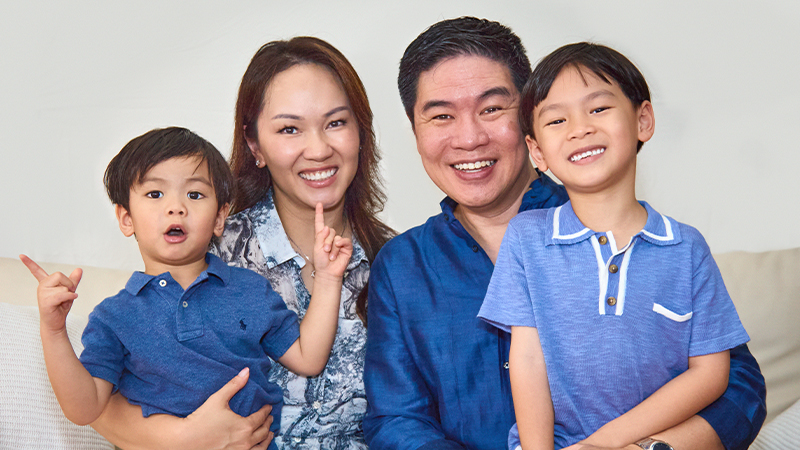
The experience was transformative for our children. From a fearful two-year-old, Alden blossomed into a confident, empathic toddler who now takes lead roles in school plays at a top international school. Since enrolling last year in this kindergarten in Singapore, Avery has learned how to build close and enriching friendships, and has advanced quickly through the curriculum.
Rain Trees has been a seamless extension of the home for our kids in their most formative and tender years. We’re full of gratitude for our confident, empathic children who have come out of the school’s play-based learning environment.
We recommend them without reservation to parents who believe in the importance of connection, confidence and a family environment in the early years of toddlerhood, but who also want the assurance of a proven “feeder school” into the top primary systems in Singapore.
255 Holland Road
6474 6181 | raintreeskindergarten.com
Overseas Family School kindergarten
Founded: 1991
Dates: August to June
Ages: From 2 years
Size: 2,500 students
Curriculum: IEYC, IPC, IGCSE, IB (MYP, DP)
Kindergarten Review: Gisele Mello Gentil Figueiredo and Gustavo Figueiredo, Brazilian; Malu (9) and Nina (4)
We moved from the Netherlands in July 2022 and both our daughters have attended Overseas Family School (OFS) since then. Malu is in Grade 3 and Nina is in Pre-K2 now.
Malu is the only one in the family who speaks Dutch; we speak Portuguese at home. When we arrived, we looked for a preschool in Singapore where she could keep practising the language. The Mother Tongue language programme at OFS was a key point for our decision. After one and a half years, she has also become fluent in English due to their English acquisition programme.
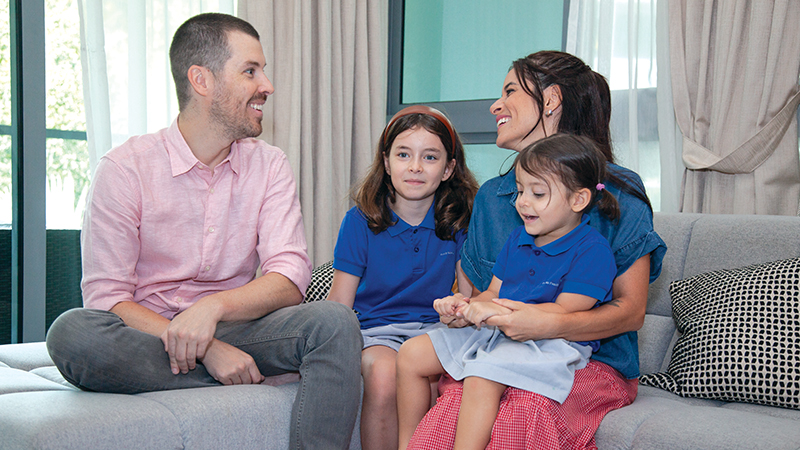
We were also concerned for Nina as she was born during the pandemic and this was her first kindergarten in Singapore. On top of that, she couldn’t speak a word of English. To our surprise, her adaptation was very easy and smooth. She loves going to OFS and she’s now more independent. She has many friends and always has fun with the preschool activities.
The curriculum offers a solid foundation in life skills. Academically, the teachers are well prepared, kind and creative. The community is diverse and helpful.
Both our daughters are very fond of their teachers, who are kind, creative and respectful. We have a supportive community, a safe learning environment, consistent and purposeful feedback for our children’s development and the facilities are incredible. Even though it’s a big community of students, it feels small and homey.
The most important thing for us is seeing our daughters going there every day with big smiles on their faces. We’re very happy with them and truly recommend it.
81 Pasir Ris Heights
6738 0211 | ofs.edu.sg
Mosaic Preschool in Singapore
Founded: 2016
Dates: January to December
Ages: From 18 months to 7 years
Size: 100
Curriculum: Play-inspired, project approach, Montessori, multi-electives/enrichments
Preschool Review: Done Booyens and Jason Rankin, South African and Australian; Olivia (5.5) and Jack (2.5)
We’ve been living in Singapore for eight years (Done) and 14 years (Jason) respectively; both Olivia and Jack were born in Singapore. Jack started at Mosaic Preschool Siglap in December 2023 at 18 months of age.
Before that, he was at Mosaic Play Academy (MPA), which we had chosen due to its focus on immersive play.
We loved the teachers and approach of MPA, so we completed a visit to Mosaic Preschool at Siglap to assess them. The teachers were very open and transparent, and focused on having a balance between play and learning. After the visit, we enrolled Jack.
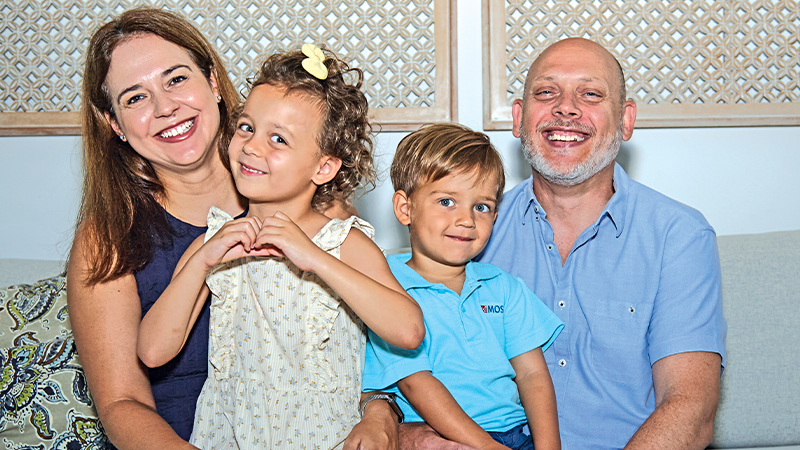
The building structure is a converted house. It feels very cosy with lots of natural light and a fresh interior with a welcoming design. There are great outdoor play areas for the kids that are utilised by the preschool as part of the curriculum.
We love that children are taken outside for an hour at the start of each day for play to develop gross motor skills and engage in nature.
The teachers are very well trained, warm and attentive to children and they communicate proactively. Their communication app is user-friendly and easy to use, ensuring good communication with parents.
We can visibly see the difference in Jack’s development – especially versus traditional preschools in Singapore. We definitely recommend them – they can be trusted!
- 20 East Coast Avenue | 9353 1402
- 896 Dunearn Road, #05-01 | 6909 0470
- 168 Changi Road, #05-01 | 6530 3979
Kinderland Academy & Preschool in Singapore
Founded: 1978
Dates: January to December (year-round enrolment)
Ages: From 2 months to 6 years
Size: 80 centres with more than 20,000 students regionally
Curriculum: Kinderland’s music infused curriculum is built around the K.I.N.D.E.R. multidisciplinary lands (Kineticland, Intelliland, Natureland, Digiland, EQ-land, cReativeland); students at Kinderland Academy @ Yio Chu Kang have the opportunity to participate in the first and only preschool marching band in Singapore
Preschool Review: Amanda Wong and Ben Moo, Australian; Chloe (11), Charlotte (7) and Jacob (5)
We’ve been in Singapore for five years. Jacob is currently in K2 at Kinderland Academy; this is his second year there.
Before we moved to the area, we were looking for a preschool close to us. Kinderland Academy stood out as a warm, nurturing and caring school. There’s so much space for the children to play outside and a large sports hall.
The principal, staff and teachers know the children well and greet them with a smile each day. In addition, they’re very communicative with parents. Every class has one English and one Mandarin teacher, with lessons in both languages.
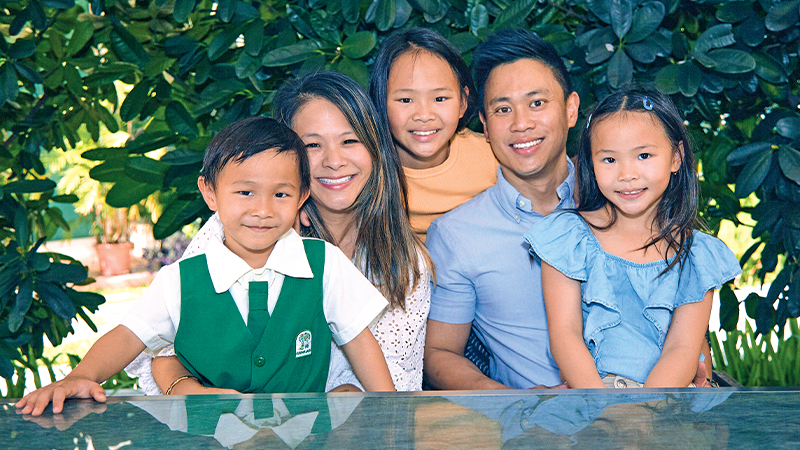
There are plenty of activities for the children such as regular weekly multi-sport lessons and technology lessons where children are taught simple coding. There are also field trips throughout the year to places like the wetlands, museums and nature centres.
The most impressive opportunity here is the marching band, Singapore’s first and only preschool marching band. Jacob was part of this last year. They learnt how to march in formation while playing the drums to music. To see the teachers’ dedication and the children’s hard work all come together for the concert at the end of the year was incredible!
In addition to this, regular keyboard lessons are part of the curriculum. The children also learn songs, dancing and even dragon dances.
During festive celebrations in Singapore, the children will do a performance at the nursing home next door for the residents. It’s so rewarding to see the children care for others and learn how to give back to their community.
We would definitely recommend this preschool to other families. It has such a welcoming environment with a well-rounded curriculum that builds a good foundation for learning and encourages children to think about the world they live in.
15 locations island-wide
kinderland.com.sg
ELFA Preschool
Founded: 2000
Dates: January to December
Size: 26 centres in China and Singapore, with 4,500 students
Ages: 2 months to 6 years
Curriculum: Mandarin-English bilingual preschool with strong focus on Mandarin acquisition
Preschool Review: Sabrina Mimoune and Maxime Jouineau, French; Ayden (1.5)
We’ve been in Singapore since September 2023. We found ELFA Preschool through an internet search. It is only a 10-minute walk from our place. We took an appointment and went to see it with Ayden. When we did the tour, he went into the arms of the teacher and had a good feeling for the teacher. He joined infant care in October 2023.
The teachers are kind, very professional and take the time to explain everything to the kids when they’re doing activities. For example, during celebrations such as Chinese New Year, the preschool organises an event i-house for the kids. The teachers will explain the event and celebrate with every kid.
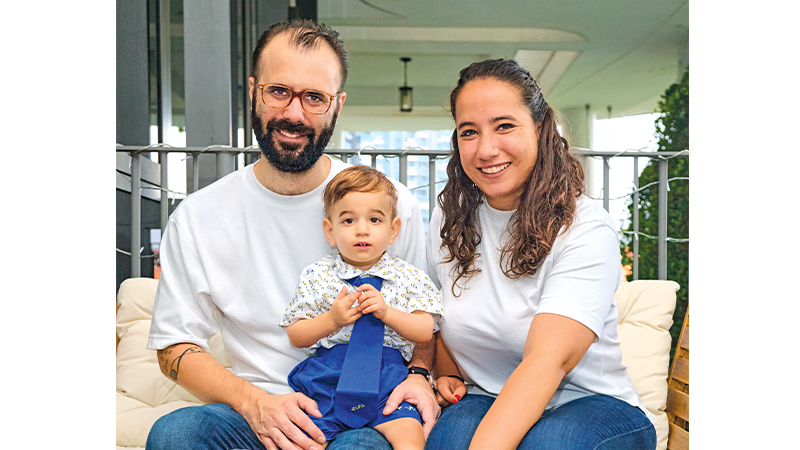
We love the contact we have with every teacher and how they respect the child’s pace. Ayden is learning things by himself like eating, playing peacefully with others, and respecting the teachers and other kids. The best thing is that because ELFA is a bilingual preschool, Ayden is learning English and Chinese at the same time.
This preschool in Singapore uses the HAVParent app to update us about what’s happening like events or if our son isn’t well. They also send pictures of the activities they’re doing at preschool.
We’ve had a good experience with them and recommend it especially for the kindness and love the teachers have for every kid.
- Blk 202 Hougang St 21, #03-00 (above FairPrice Finest)
- Blk 135 Jurong Gateway Road, #03-341 (above NTUC FairPrice)
- #04-01 Tampines Central Community Complex, Blk 866A Tampines Street 83
6881 8818 | elfapreschools.com/singapore
International French School (Singapore) Kindergarten
Founded: 1967
Dates: September to early July
Ages: 2 to 18 years
Size: 3,000 students
Curriculum: French Curriculum taught in French and English, IGCSE; non-French speakers accepted until Grade 6
Kindergarten Review: Thea Gao and Jean-Baptiste Silva, Chinese and French; Emma (6.5), Noémie (4)
We arrived in Singapore from Hong Kong in March 2023. Both our daughters were already enrolled in the French International School in Hong Kong so we transferred them to the International French School (Singapore) (IFS) in early April 2023.
Our experience at this kindergarten in Singapore has been excellent so far – a responsive team, caring teachers and amazing facilities. We love that our kids are exposed to a 50- 50 ratio of French and English daily, allowing them to effortlessly become fluent in both languages. It’s the perfect environment for non-French speakers to learn the language smoothly and for French natives to master English without losing their French.
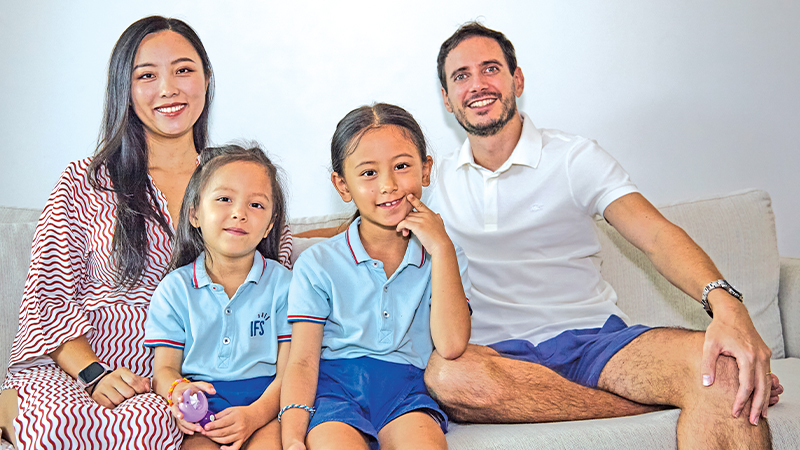
In addition, the choice of extracurricular activities on offer is amazing. From sports to science and even cultural activities, nothing’s missing!
We love the fact that no matter the age of our kids, there’s one big campus welcoming all kids together. What really surprised us was the possibility to send and pick up the kids every day at the doorstep of their kindergarten classroom. This gives us a chance to discuss things with the teachers on any day.
We definitely recommend this kindergarten in Singapore, for the constant loving attention of the staff to making sure that all kids are well looked after and the fluid communication. Let’s not forget the little French touch given frequently during canteen times with bread, cheese, desserts and other things that our kids love!
3000 Ang Mo Kio Ave 3
6805 0000 | ifs.edu.sg
XCL American Academy Kindergarten
Founded: 2022
Dates: August to June
Ages: From 4 years
Size: 200+
Curriculum: American
Kindergarten Review: Mio and Koh Iwasaki, Japanese; Soh (8) and Shun (6)
Soh and Shun have been attending XCL American Academy (XAA) since we arrived in August 2023.
Before we moved from New York, we were looking for a kindergarten in Singapore with an American curriculum for our children’s smooth transition. XAA’s admissions team held a private online session and we were impressed by the friendly and warm atmosphere.
Their curriculum is fully in line with the Common Core curriculum in the US. In addition, there’s a unique PioneerTown programme to provide students with opportunities to learn about business and entrepreneurship.
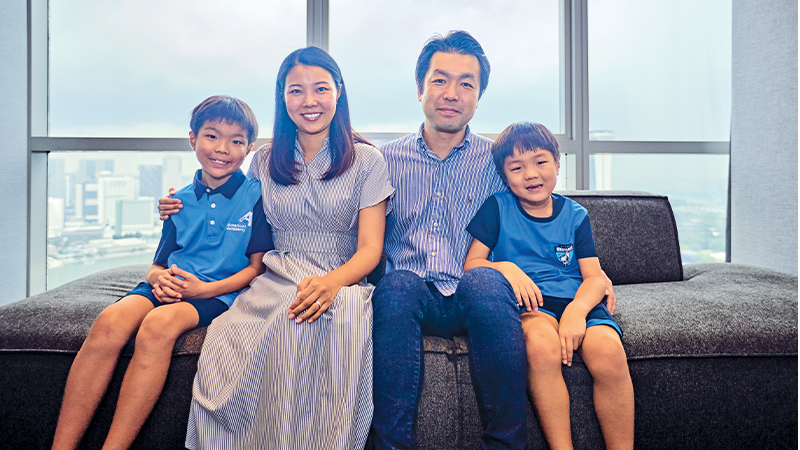
Most of the teachers are from the US and Canada. Besides helping students with their studies, they also strongly support personal development. We’re grateful to them for always being there for the children and devotedly working with them. Our children miss their teachers every holiday.
The facilities are new and spacious. In addition, the students have access to facilities at the neighbouring school, XCL World Academy, such as a 750-seat auditorium, an all-weather Olympic-sized swimming pool and a canteen headed by a Michelin-starred chef.
There’s a wide diversity of nationalities of students, making it easy for children from any backgrounds to join them. It celebrates many different cultural festivities, enabling students to learn to respect each other’s countries and cultures. The number of students keeps increasing and it’s becoming more and more lively.
The kindergarten also enables close communication between the teachers and parents through an app.
We look forward to their future and definitely recommend them to other parents.
2 Yishun Street 42
6230 4222 | xaa.edu.sg
XCL World Academy International Kindergarten
Founded: 2013
Dates: August to June
Ages: From 2 years
Size: 1,000
Curriculum: Nursery, IB (PYP, MYP, DP)
Kindergarten Review: Ayano and Ryota Murakami, Japanese; Soichiro (7) and Kotaro (5)
We moved from Tokyo to Singapore in April 2023, when both children started XCL World Academy (XWA). Soichiro joined KG2 and is now in Grade 1, Kotaro joined Pre-K and is now in KG1.
We were looking for a kindergarten in Singapore that had international diversity. We liked the relaxing, open-minded atmosphere here, where our sons would be able to explore themselves and nurture self-confidence.
When we moved here, our sons weren’t able to speak English at all. They were struggling in the new environment and there were times they didn’t want to go to school. The teachers were extremely supportive, caring and patient. In addition, we got a lot of support from the Japanese Liaison teacher.
There are chances here for the kids to perform at the morning assembly. After his first three weeks, Kotaro was on stage with his classmates singing and dancing!
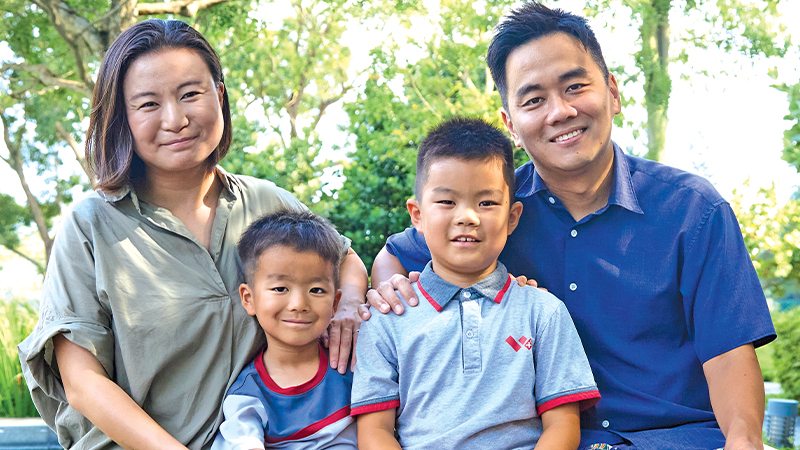
In Kindergarten, the students have to occasionally prepare a presentation for the class. We think it’s important for kids to stand in front of their classmates and present what they feel and think. Kotaro is getting used to this and we feel he’s getting more confident little by little.
Soichiro has been taking EAL lessons since Grade 1 to intensively learn basic English. In addition, he takes Japanese Mother Tongue lessons, where he learns how to read and write Japanese.
We definitely recommend XWA, especially for those who want to maximise their kids’ potential. The teachers are fully supportive and they love and trust your children. This supportive environment is a key for the kids to take on challenges and grow.
2 Yishun Street 42
6230 4230 | xwa.edu.sg
EtonHouse International Preschool in Singapore
Founded: 1995
Dates: Local preschools – January to December; international preschools – August to June
Ages: From 9 months
Size: 3,000+ students
Curriculum: IB PYP, IGCSE, International A-Levels
Preschool Review: Erin and Alexander Phillips, British; Penelope (7) and Kai (5)
We have lived in Singapore for 11 years. Poppy has been attending EtonHouse Broadrick since February 2022, Kai since August 2022.
The preschool has a lovely “at home” feel while offering a vast and green outdoor area for the kids to play and explore. Classes are sometimes taken outside, which our son enjoys in particular .
Another big pull for us was the Japanese language programme, which they offer as part of the Mainstream Learning curriculum. With familial ties to Japan, we wanted to continue to support their Japanese learning in terms of language and its cultural nuances too. Our kids really enjoy their time in this class.
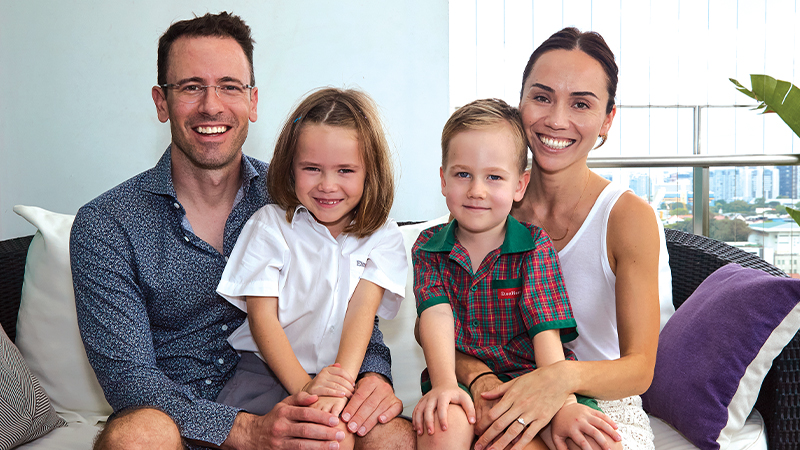
The children are allocated into one of four houses, a system that emphasises the sense of belonging for the children while integrating them across all ages and year groups.
EtonHouse Broadrick draws from the multicultural background of the school community and reinforces a sense of cross cultural identity and belonging, which for us is hugely important. We wanted our children to feel part of a strong community that celebrates diversity.
The preschool welcomes parent participation in all aspects, from joining the PSA to volunteering and becoming mystery readers in class.
Living across from the preschool, we love that our children are able to walk with their friends there. From the initial meeting and tour of the grounds, it’s clear that this preschool was right for us.
14 locations island-wide
etonhouse.edu.sg
Chatsworth International School kindergarten
Founded: 1995
Dates: August to June
Ages: From 3 years
Size: Approximately 800 students
Curriculum: IB (PYP, MYP, DP)
Kindergarten Review: Nisha and Sid Gidwani, American; Zara (7) and Nina (5)
We have been in Singapore for one and a half years. Zara started in Y2 and Nina in K1 at Chatsworth International School kindergarten in Singapore; they’re now in Y3 and K2 respectively.
We were looking for a programme that’s different from the traditional American school experience and where the girls would thrive academically and socially.
The daily schedule here is student-led and inquiry-based so students ask questions then research the answers. The K levels are especially unique because of their small size and the topics covered – learning about Singapore, recreating an MRT station, learning what makes a community, shapes, phonics, numbers and so much more! While it’s different from traditional worksheets, we know that learning is happening from the projects we get to see.
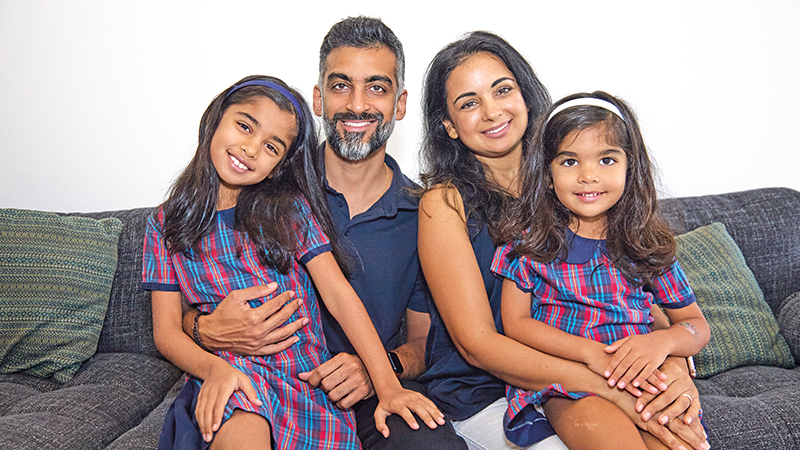
In addition to the basic concepts of reading, writing and maths, they’re also learning to be critical thinkers by challenging ideas, looking at things differently, researching information, teamwork with group learning as well as learning about different cultures with celebrations for Chinese New Year, Hari Raya, Diwali and Christmas.
There’s a buddy system where students of higher grades and lower grades spend time together working on projects or reading. This fosters a level of caring for the school community among the older kids while the younger students are learning from their older friends.
The campus is set in nature and the kids see bats and monkeys on a regular basis, something we wouldn’t have imagined in America. There’s a variety of CCA and ECA activities after preschool. They include sports, arts, Lego, jewellery making, Minecraft, dance and much more.
The school feels like a family where you really get to know the teachers, staff and other parents. Every time we pick up our kids, we run into parents who we know. We absolutely love it.
72 Bukit Tinggi Road
6463 3201 | chatsworth.com.sg
Nexus International School (Singapore) Preschool
Founded: 2011
Dates: August to June
Ages: 3 to 18 years (Nursery to year 13)
Size: 1,500 learners
Curriculum: IB, IGCSE
Preschool Review: Sarah and Zach Tritz, American; Cole (8), Norah (6) and Claire (4)
All three of our children started their Nexus journey in February 2023, when we moved to Singapore. We wanted them to attend together, and before we arrived here, Nexus connected us with another American family who had recently enrolled children of similar ages to ours. Their positive remarks about the preschool were a huge contributing factor in our decision.
Our experience has been remarkably positive! The preschool’s commitment to fostering academic excellence and the overall development and wellbeing of the students has been refreshing.
Our kids each have different learning styles. The staff and team get to know each child as an individual, and creates a learning environment that’s both supportive and enriching to each one.

We desire for our kids to experience and learn about different cultures during our time in Singapore. Here, our children have friends and teachers from all around the world.
The team also includes parents in the school community through events, classroom activities and other aspects. This helps provide a network of families, which aids in keeping updated on schedules, activities and other areas of focus.
Another highlight that drew us to them is their strong emphasis on sports education, which our kids are passionate about. Swimming is part of the core curriculum, there’s a wide range of sports and the facilities are state of the art. The diverse range of co-curricular activities has enabled our kids to enjoy music, art, team sports, robotics and leadership activities.
If you’re looking for an international preschool in Singapore where your children can flourish both educationally and personally, you will find a great community here that wants the best for each student.
1 Aljunied Walk
6536 6566 | nexus.edu.sg
Brighton College (Singapore) Preschool
Founded: 2000
Dates: August to July
Ages: 18 months to 13 years (Pre-Nursery to Year 8) with 14 years (Year 9) in 2024; Years 10 and 13 in 2025 Size: 550 pupils
Curriculum: Early Years Foundation Stage, English National Curriculum and Cambridge Assessment International Education (IGCSE & A-level)
Preschool Review: Ana and Eduardo Garriga, Peruvian and Venezuelan; Matias (8) and Victoria (3)
Both our children were born in the United States and we’ve been living in Singapore for four years. Matias was attending a different preschool in Singapore and we realised it wasn’t the right fit for him. We started visiting other schools and we saw that Brighton College (Singapore) had recently opened. He has now been here for three years. Victoria started attending in January 2024.
The preschool’s tailored curriculum ensures personalised learning for every child. They make sure every child’s uniqueness is recognised and celebrated.
From Pre-nursery, the kids are exposed to Mandarin. Once they reach Grade 3, French is also added as an extra language; every child then gets Mandarin and French classes. Brighton doesn’t only focus on academics, though – they teach life skills and tools such as empathy, compassion, social responsibility and resilience for kids to become better human beings, The school community is tightly knit. They try to ensure every student knows one another regardless of grade level. All the kids from the same grade would know each other and that definitely caught our attention.
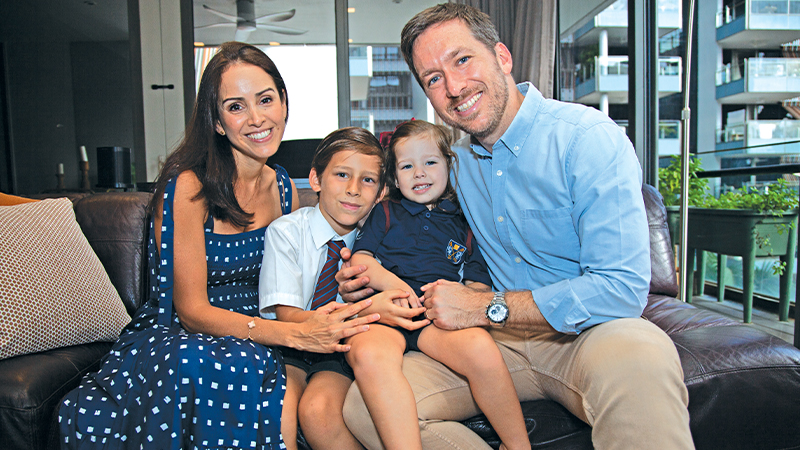
We absolutely recommend this preschool in Singapore. They offer a nurturing and structured environment at the early stages of education and much more. Our kids go to and come back happy. They share the good stories, and even on their bad days they tell us how the teachers and staff made them feel comfortable.
1 Chuan Lane
6505 9790 | brightoncollege.edu.sg
The Grange International Preschool Singapore
Founded: 2018
Dates: January to December
Ages: From 3 years
Size: 82 students
Curriculum: IEYC (Preschool) IPC & Cambridge (Primary)
Preschool Review: Kyungjin Lee and Ka-Ming Lau, South Korean and American; Mischa (7) and Sasha (5)
We’ve been living in Singapore for just over two years and both our daughters started attending The Grange International Preschool (TGIP) in 2023. They’re now in their second year, currently in Year 1 and K1 respectively.
We found TGIP through an internet search. We decided on them for a few reasons. The preschool’s location is between our residence and Ka-Ming’s place of work. Hours are 10am to 4.30pm, which gives our daughters enough time for a good night’s sleep. The campus gives us an “old school” feel but we like it as it gives our kids a better chance to connect more with the natural environment. Lastly, the tuition fee is on the lower end of the spectrum for an international preschool in Singapore.
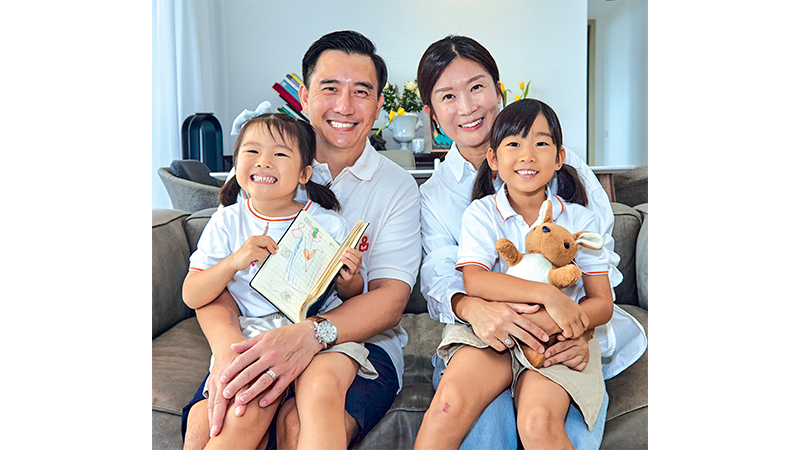
It’s a relatively small preschool so the students and teachers can have a more intimate relationship with each other. In addition to the basic maths, reading and science classes, their curriculum also includes language – Chinese, Japanese or additional English – plus music, physical education twice a week and cocurricular activities once a week.
Although the student body is relatively small, it boasts an array of international representation. In addition to Singaporean students, there are also students from Japan, Korea, India, Pakistan, the US, Russia and the Philippines, just to name a few.
Our kids really enjoy going TGIP and look forward to school every morning. We recommend them to parents looking for a smaller sized community with an emphasis on nature and who don’t find it necessary for high-tech auditoriums or Olympic-size swimming pools.
449 Yio Chu Kang Road
6817 3630 | preschool.thegrange.edu.sg
One World International School Nanyang Campus Early Childhood
Founded: 2008
School year: August to June
Ages: From 3 to 18 years
Size: 1,300 students
Curriculum: IB (PYP, DP), modified Cambridge, IGCSE
Preschool Review: Lyn Padani Lotan and Yoav Lotan, Israeli; Naomi (11), Barak (9) and Neri (4.5)
We’ve lived in Singapore for over six years and this is Neri’s first year in the Early Childhood (EC) 2 class at One World International School (OWIS) Nanyang Campus. Barak and Naomi started here five years ago and are now in G3 and G5 respectively.
We absolutely recommend them! Firstly, for its core values, which was a key reason in choosing them for Naomi to start her EC2 at.
Secondly, their community fosters a family-like atmosphere, with a personal touch extended to each family. This nurturing environment is invaluable for young children and their families.
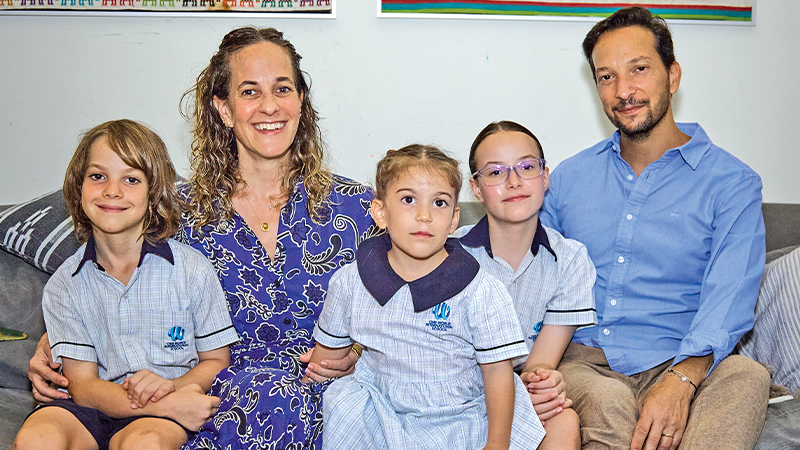
One element that truly stands out is the incredible human connection. From the dedicated teachers to the supportive staff and leadership, we feel they genuinely listen and understand our children’s individual needs. This was essential for us especially in the early years, as we wanted to be sure our kids were seen and nurtured. The team has exceeded our expectations in this regard.
For instance, when we were faced with a challenge, the teachers offered emotional support, connected us with relevant resources and even checked in regularly to ensure progress. This personal touch truly demonstrated the school’s commitment to our family’s wellbeing.
Academically, this preschool in Singapore has engaging methods help children grasp new concepts, while maintaining a strong foundation in core subjects.
Overall, OWIS Nanyang has provided an exceptional educational and social experience for our family. We’re confident that our children are thriving in this supportive and stimulating environment.
It’s wonderful to see our children thrive in an environment where they feel appreciated. It really brings us peace of mind knowing they’re well cared for in such a positive space.
21 Jurong West Street 81
OWIS also has campuses in Punggol and Suntec
owis.org/sg
Mulberry Learning Preschool in Singapore
Founded: 2006
Dates: January to December (on-going admissions)
Ages: From 2 months
Size: 1,500+ students
Curriculum: Mulberry Learning’s award-winning iLearn/iExplore/iExperience/iDevelop curriculum features elements from established global pedagogies such as Habits of Mind, Reggio Emilia and Multiple Intelligences
Preschool Review: Anastasiia and Alexander Baskov; Nika (5)
Nika has been attending Mulberry Learning at Shenton Way for the second year now. We chose them as it’s a preschool in Singapore that’s closer to home, with a strong day care programme and Chinese language.
We really enjoy the day care programme and plan to stay there as long as possible before preschool starts. Children learn letters and numbers, and they sing songs and read books.
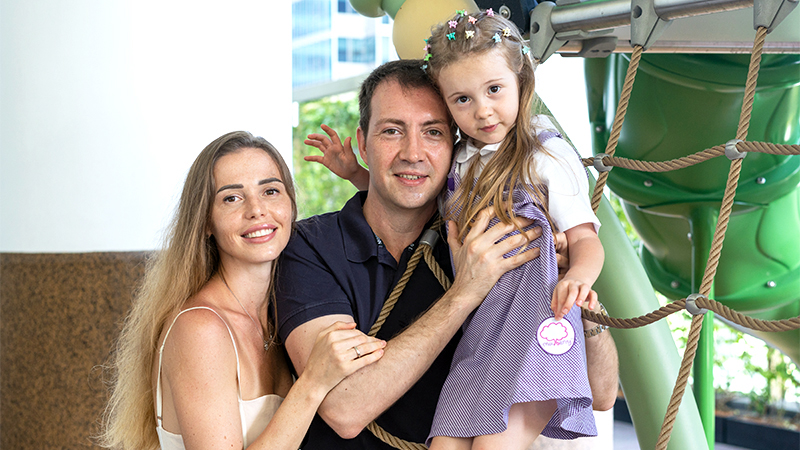
All the training is conducted in English and Chinese languages. We really like the friendly staff and teachers; there’s always a friendly atmosphere in the preschool.
We are very pleased to be part of this preschool. Nika happily attends classes, meals and training sessions. We definitely recommended it!
16 centres islandwide | mulberrylearning.com
Where to find preschools in Singapore
Wherever you live in Singapore, there’s a preschool or kindergarten that’s the perfect fit for your family! Here’s a general overview of where you can find them. (Some schools have multiple campus locations, so be sure to check online, too.)
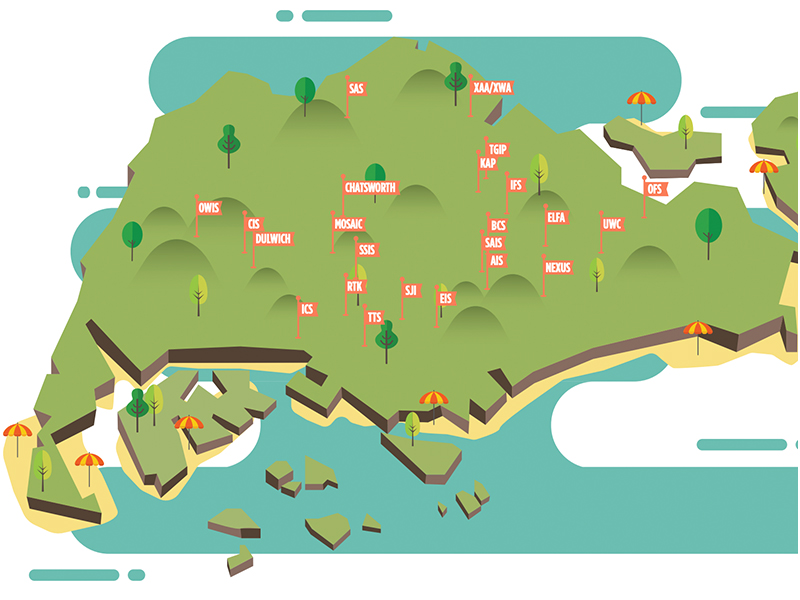
9 questions to consider
- Is the location of the campus convenient to home and transport options?
- Which education curriculum will suit my child’s educational needs and our family’s future plans?
- How do the class sizes and teacher-to-child ratios vary among preschools on my list?
- Is Mandarin taught as a second language, and is this an experience my child will benefit from?
- Will the extracurricular activities enhance my child’s experience and balance the academic side?
- What are the opportunities for parent participation, such as reading groups, excursions and so on?
- How does the preschool communicate with parents about the child’s experiences and learning?
- Is there flexibility around the times and number of days per week that my child can attend?
- What do I know about the preschool’s daily and weekly programmes, and the activities the children will be engaged in?
3 key terms for parents to know
Preschool
Before beginning statutory education at the age of six years in Singapore, many children attend preschool from the age of 18 months upwards. In Britain, preschool is known as nursery school or playgroup, while in the US the terms preschool and pre-K are used.
Kindergarten
In Singapore, many international schools use the term kindergarten to describe the first, and sometimes second, year of primary school education. However, the Singapore Ministry of Education uses the term kindergarten to mean a preschool that provides a structured three-year preschool programme for children aged four to six. Children learn activities that develop language and literacy skills, basic number concepts, social skills, creative and problem-solving skills, appreciation of music and movement, outdoor play, English as a first language, and Chinese, Malay or Tamil.
Curriculum
After “fun” and “play”, one of the first words you’re likely to encounter when visiting preschools is “curriculum”. The curriculum is essentially the syllabus that underpins the learning principles at the heart of every preschool. There’s a huge range of curriculums and teaching philosophies adopted in Singapore, from Montessori to Reggio Emilia, to the International Primary Curriculum. Many schools have adopted a hybrid or tailor-made curriculum that draws on elements of well-known systems, infused with the individual passions and beliefs of the school founders. Whatever is in place at the schools you look at, be sure to find out how it will suit the needs of your child.
This round-up of kindergartens and preschools in Singapore first appeared in the April 2024 edition of Expat Living. You can purchase the latest issue or subscribe so you never miss a copy!
To make the most of living in Singapore, read our latest City Guide here for free!


